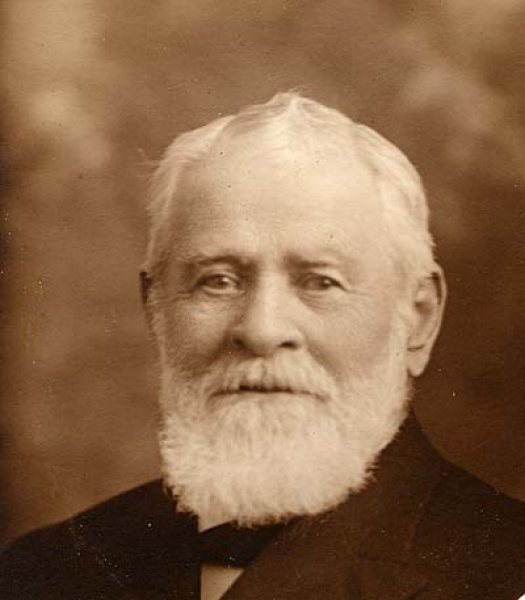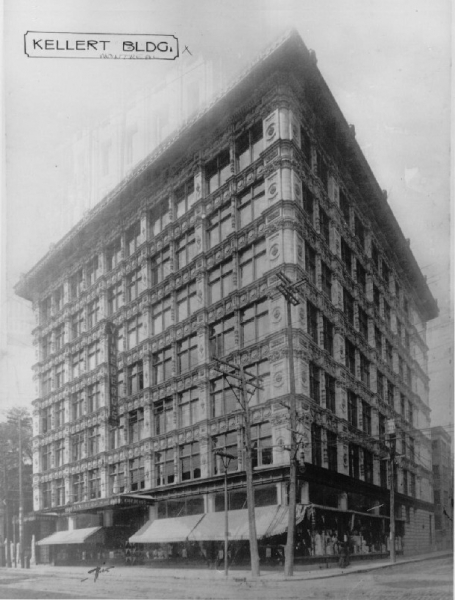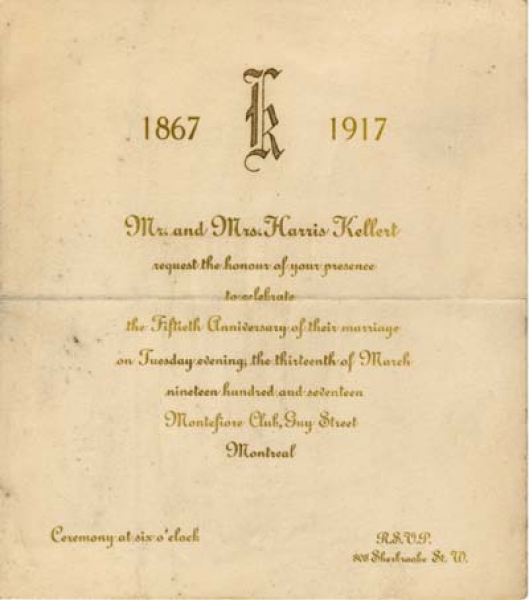The Three Men from Lancaster: Noah Friedman, Harris Kellert and Solomon Levinson - H. Kellert & Son, wholesale clothiers
1911 - 1931
175 Rue Ste-Catherine O
By the 1880s, these three Montreal-based Jewish businessmen were the owners of some of the largest garment factories in the country. After emigrating from Eastern Europe to North America in the 1850s, they first settled in Lancaster, Ontario, where they worked as peddlers and general store owners.
During the 1860s, Noah Friedman sold his belongings and moved to Montreal to enter into the manufacture of men’s ready-to-wear. Soon after, he was followed by his brother-in-law, Harris Kellert, and together they founded the Kellert and Friedman Company. In 1874, Solomon Levinson left Lancaster as well and launched a garment manufacturing business of his own. Their companies quickly grew to compete with the largest producers in Canada’s clothing sector.
Their rise from humble beginnings was remarkable, all the more so in an industry largely controlled by non-Jews. In their transition from the status of retailers to that of industry barons they acquired considerable power, and soon hundreds of labourers worked in their factories, located in the industrial district near St. Lawrence Boulevard. These men were true pioneers in the garment manufacturing, or “shmata”, business, a sector in which Montreal Jews are still active to this day. Until the 1960s, the shmata business contributed to the social mobility of many in the Jewish community. Established among the city’s “uptown” Jews, Friedman, Kellert and Levinson did not refrain from exploiting the labour of Montreal’s "downtowners”, who were mostly newly arrived and impoverished Jewish immigrants. Working conditions in the garment industry were deplorable, and yet the constant influx of poor immigrants and rural French Canadians provided an abundant supply of manpower that helped to maintain the workers’ dire socio-economic conditions. The garment sector entrepreneurs who founded the Clothing Manufacturers’ Association of Montreal in 1908 vigorously opposed the trade union movement and its demands for better working conditions. Nonetheless, labour actions such as the strike of 1912 were able to obtain shorter hours and somewhat higher wages for garment industry workers.
Compiled by Valérie Beauchemin
Links
Liens
Sources
King, Joe. Les Juifs de Montréal: Trois siècles de parcours exceptionnels. Outremont, Éditions Carte Blanche, 2002.
Tulchinsky, Gerald. “Said to be a very honest Jew: the RG Dun Credit Reports and Jewish Business Activity in Mid-19th Century Montreal”, Urban History Review, vol. 18, no 3, 1990.
Tulchinsky, Gerald. Canada’s Jews: a People’s Journey. Toronto, University of Toronto Press, 2008.
Tulchinsky, Gerald. Taking Root: the Origins of the Canadian Jewish Community. Toronto, Lester Publishing Limited, 1992.
*Images courtesy of the Congregation Shaar Hashomayim Museum and Archives.


This project is funded in part by the Government of Canada.
Ce projet est financé en partie par le gouvernement du Canada.
Ce projet est financé en partie par le gouvernement du Canada.
This project is funded in part by the Government of Canada.
© 2011-2015 Museum of Jewish Montreal, All Rights Reserved.
Site by Air Code Design inc. ![]()
© 2011-2015 Musée du Montréal Juïf, Tous droits réservés. Site par Air Code Design inc. ![]()


